
By Leta Gail Doerr
Does it seem like our culture is obsessed with looking younger? There are hundreds of creams, potions, procedures, and treatments that are all geared towards reversing the signs of aging. However, what is often not understood is that the reasons and psychology behind the seemingly tireless pursuit of “looking younger” may have little or nothing to do with a desire to turn back the clock, and more to do with reconnecting with our own reflection in the mirror — the desire to simply look good, no matter what age you are.
The person we’ve seen in the mirror each day will start to change rather dramatically as we enter middle-age. There is a wide range of more noticeable signs of aging during our 40s than may have been present during our 20s and 30s. Women will start to see more fine lines and wrinkles, including those horizontal forehead lines that may seem to simply appear overnight. Facial skin often becomes less vibrant and prone to sun spots. Moreover, the appearances of frown lines can make a person look chronically tired and unhappy.
Adrienne Schupbach, M.D., of Dermatology and Mohs Surgery Institute in Bloomington says that, “For many of our patients who seek out various skin rejuvenation procedures, the motivation is simply to look good at any age, and not about wanting to look younger. A good majority of our patients are middle-aged. And their motivations for treatment are just as varied as their ages.”
According to Dr. Schupbach, patients most often seek treatment for at least one of these three objectives: improvement in fine lines and wrinkles, improvement in acne and other scarring, or improvement in pigmentation, including sun damage and spots. There are many different cosmetic treatment options and methods to meet anyone’s needs.
Perhaps the most widely known is Botox®, which is a prescription medicine that is injected into muscles to improve the look of moderate to severe lines affecting the forehead and corners of the eyes. Commonly treated areas include forehead lines, frown lines, and the “crow’s feet” lines. Botox works by blocking nerve impulses to the injected muscles, which reduces muscle activity and relaxes facial lines. When done by an experienced professional, the results are excellent and usually last three to five months.
There are many different types of lasers and laser procedures that all help to reduce the signs of aging and improve the look of the skin. Dr. Schupbach suggests that people consider Fractional Laser Resurfacing. She says that, “Fractional Laser Resurfacing is a newer treatment method that is much more effective than Botox and achieves results much quicker.” The resurfacing procedure creates microscopic columns of “injury” in a grid type fashion so that normal skin is left intact around the ablated columns. The healing process stimulates collagen, so the look of fine lines and wrinkles is reduced, and skin has a more vibrant appearance.
The results of Fractional Laser Resurfacing can last for years. Unlike Botox, which can only be used to reduce lines formed by muscle movement and is ineffective for lines and wrinkles present at rest, laser resurfacing can be used on all parts of the face.
When looking into a cosmetic procedure, it is easy to get confused because there are many various types of laser treatments, and each one works a little differently. Therefore, be sure you understand what each procedure involves and get all the information you need ahead of time. Even though the media may make it seem like skin rejuvenation procedures are common place and you can just walk in and have it done, these are medical procedures that have a certain level of risk and may not be suitable for everyone. A board-certified dermatologist has extensive training in the structure and function of skin and is best able to advise and resolve your skin health concerns.
For more information or to schedule an appointment, you may contact the Dermatology and Mohs Surgery Institute at 309-451-DERM (3376) www.dermatologistbloomington.com. Dr. Leone and Dr. Schupbach are board-certified dermatologists, specializing in medical and cosmetic dermatology, including the treatment of skin cancer, moles, acne, rashes, warts, and all skin disorders. Dr. Leone is one of the few Mohs trained surgeons in the area. Their practice, is located at 3024 E. Empire St. 2nd floor (in the Advocate BroMenn outpatient center).

